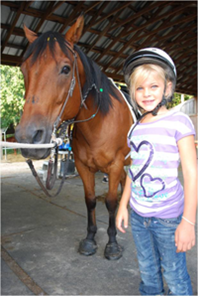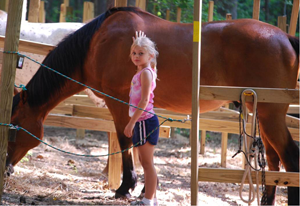Lyviya's Story
Lyviya loves horses.
Sure, every little girl wants a pony at some point or another during her young life, but, according to her father, Liviya has always held a special place in her heart for all things equine. Little did her parents know when she was born how true and profound a statement this would one day turn out to be.
Liviya Anderson was born in September of 2004 in San Diego, California. A full-term baby with no complications, she was the second child of Brian and Rebecca Anderson, who had been blessed with their son, Axel two years earlier. She was the angel her father had always hoped for—bright and bubbly, curious and cute,; and she grew into the little princess he’d dreamed about spoiling.
And for Liviya, spoiling meant access to, and time spent with, horses.
She had her first horseback ride at a county fair when she was two, and it was love at first sight. Riding lessons followed later on when she was old enough, as did a room full of horse posters and book bags, toys, and clothes emblazoned with horse prints, stickers, and emblems. A talented artist, her colorful drawings were more often than not the repository for lively daydreams involving horses of all shapes, sizes, and colors.
For her entire life up until that point, Livi was rarely—if ever—sick. Sure, she had a cough now and then, and the sniffles that plague all kids during a cool autumn spent outside playing in the leaves, but never anything of any significance. So it was a complete shock to her parents one scary day in pre-Halloween October when Liviya had to be rushed to the emergency room with a dangerously high fever.
Liviya’s father was on a plane heading home when he received the call telling him to meet his family at the hospital once his flight arrived. He was returning from the 2010 American Association of Laboratory Animal Science (AALAS) National Meeting in Atlanta, Georgia. He works in the lab animal science sector of the larger biomedical research community, and the AALAS show is the largest, most important event of the year.
At first, Liviya's illness was thought to be a simple case of strep throat, but a quick glance at her skin while listening to her lungs revealed a series of red spots (burst blood vessels called petechiae) that held the potential for more serious conditions. Petechiae are often the indicator of a low platelet count that can lead to easy bleeding and bruising. Sometimes, petichiae can be caused by leukemia.
Cancer is one of those things that universally strike terror in the hearts of all of us. Even the word is chilling. Liviya’s father states, “I remember feeling as though my spine was made of icicles the first time I carried Livi into the Cancer Center where she was to be tested. However, we believed ourselves fortunate at the time when the test, which was a painful bone marrow biopsy, revealed that my sweet little girl did not have leukemia as we feared, but a condition then unknown to us called severe acquired aplastic anemia. My wife and I breathed a collective sigh of relief.”
Their relief was short-lived, however. Liviya’s doctor looked them square in the eye and said, “You wish she had leukemia…AA [aplastic anemia] is so rare, and the treatments options are so few. You wish she had leukemia, because we would know the path to take in treating her."
He went on to explain that AA is a blood disorder in which the body's bone marrow doesn't make enough new red blood cells, white blood cells, and platelets. Red blood cells carry oxygen to all parts of your body, while white blood cells help your body fight infections. Platelets are blood cell fragments that stick together to seal small cuts or breaks in blood vessel walls and stop bleeding.
If your bone marrow can't make enough of these blood cells, many health problems can occur. In fact, severe aplastic anemia—the kind that Livi has—can even cause death. Unfortunately, so little is known about AA at this point that the doctor was essentially saying even a diagnosis of leukemia would have been preferable.
However, once it was determined that Liviya had AA, the doctor immediately advised them the available treatment options for the condition: a bone marrow transplant and/or immune suppression. Because a bone marrow transplant has the highest rate of success, it was of course selected as their first option, with Liviya’s brother, Axel, being tested to see if he was the required exact match. Unfortunately, he wasn’t, so they turned their sights instead toward the second option: immune suppression, which carries a worrisome 50/50 chance for success.
In some cases of AA, such as Livi’s, the reason the bone marrow can’t make enough blood cells is because the body’s immune system has gone haywire and has begun attacking its own cells by mistake. No one really knows why. Immune suppression potentially disables the immune system to prevent this attack from happening. Unfortunately, the suppression is not selective, and cannot be targeted to prevent only the destruction of valuable cells. Once the immune system is switched off, the body’s ability to fight all cells—and all infection—is shut down as well. The result is a patient who becomes incredibly susceptible to illness and disease from even the most minor colds and viruses.
Immune suppression, in this case, was accomplished by transfusing a live antibody from an animal directly into Liviya’s heart so that it could be swiftly dispersed throughout her entire body over a period of 8 days. The animal antibody effectively kills the immune system’s T-cells and halts the destruction of Livi’s necessary blood cells.
The available choices for an animal antibody? A rabbit or a horse - guess which one Livi chose?
This process of isolating the horse antibody was perfected through animal testing, as was nearly every other process, procedure, and drug that Liviya has undergone since the beginning of her ordeal. Thankfully, the horse antibody did its job and shut down Livi’s immune system. Once this had occurred, new drugs were given to rebuild her bone marrow in the hopes that it will begin producing new blood cells once again.
Today, Liyvia’s immune system is back to about 60% and things are moving steadily in the right direction. Her parents don’t know, however, if and when it gets back to 100%, whether or not it will once again start attacking her blood cells and force her treatments to start all over again. What they do know is that the effects of her AA will be with Liyvia in one form or another, for the rest of her life. She’ll always be susceptible to serious infection at the least, and the resurgence of her anemia at the worst. She’ll need to be tested regularly and be always vigilante.
Have you heard? Liviya loves horses.











